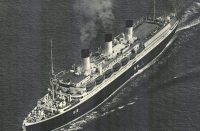In order to properly understand the relationship between the Bolsheviks and the West, it is important to remember that the Leninists «cheated» the Anglo-Saxons. They underlined the most important points: they didn’t sell off the country; they didn’t give out its wealth. But as long as the Russian Civil War was ongoing, there was hope that the Bolsheviks would «come to their senses» and do «what was necessary.» There was little support for the resistors against communism and Bolshevism. But, even without them, there was no getting around that someone had to play the role of the butcher and boogey man to ensure the loyalty of the more firebrand revolutionaries.
Likewise, in 1920-1921, there was nut much need for the German National Socialists. Therefore, any support that they turned out and their modest successes in those years can be attributed to Hitler’s talents and the enthusiasm of his friends and admirers. At that time it was mostly kind-hearted old ladies that were giving the Nazis a bit of campaign money. So things for the pure Aryans were going from bad to worse. «Up to the middle of 1921, the party could not maintain a cashier; its workers that were out putting up posters did not have money for glue!»
 Portraits of Hitler at the time show him in simple, often second-hand clothes. He lived in a squalid little pre-furnished room on Triftstrasse, with worn linoleum on the floor. His only furniture was a bed, bookshelf, one chair and a makeshift table[Hanfstaengl, Ernst ‘Putzi’. Hitler: The Missing Years]. Frideling, the granddaughter of Hitler’s favorite composer, Richard Wagner described him as wearing «Bavarian leather breeches, short coarse wool socks, red and blue checkered short and a short blue jacket that hung baggily on his bony figure.»[Hitler and Stalin: Parallel Lives by Alan Bullock]
Portraits of Hitler at the time show him in simple, often second-hand clothes. He lived in a squalid little pre-furnished room on Triftstrasse, with worn linoleum on the floor. His only furniture was a bed, bookshelf, one chair and a makeshift table[Hanfstaengl, Ernst ‘Putzi’. Hitler: The Missing Years]. Frideling, the granddaughter of Hitler’s favorite composer, Richard Wagner described him as wearing «Bavarian leather breeches, short coarse wool socks, red and blue checkered short and a short blue jacket that hung baggily on his bony figure.»[Hitler and Stalin: Parallel Lives by Alan Bullock]
Another description: «in heavy boots, a dark suit and leather vest with a strange little mustache, he is not really impressive. Looks like a waiter at some train station restaurant.»[Hanfstaengl, Ernst ‘Putzi’. Hitler: The Missing Years]
Hitler’s attitude towards work was also extremely peculiar: «He drove everyone to despair, because no one could ever be certain whether or not he would show up to a planned meeting and it was impossible to force a decision out of him.»
Pfeiffer von Zalomon, the future head of the Nazi Storm troopers said that the first time he saw his Fuhrer, he generally refused to get to know him, because he was dressed like a bum: old business card, yellow leather boots and a backpack on his back. Another described Hitler attire in this period as: a blue suit, violet shirt, brown vest and a bright red tie.[Joachim C. Fest, Hitler] You would agree that the spectacle of the future Fuhrer was quite odd. Today, we would say that his branding and marketing people would have a lot of work to do. But it worked! Can anyone imagine 1941 Hitler in shorts?
Hitler had very modest personal expenses. On Easter 1923, he got a few marks from Goering to go for a holiday excursion in the mountains for himself. Later recalling these years, he said «for a long time I ate only Tyrolean apples. It is incredible the amount of saving we did back then. Ever mark saved was later spent by the party.»[Konrad Heiden, Fuhrer]
As they say, beggars can’t be choosers, and that is why Hitler’s first followers were all so idealistic. Because their leader did not work for money, but for the idea, and this brought no less respect and admiration to Hitler than his oratorical skills. When did the Nazis’ financial position begin to improve? It appeared when they needed it the most. As we can see, there was no such need for it in 1921, nor was it there in early 1922. Historians tell us nothing about the Nazis’ financial «miracle» during this period.
 From April 10 to May 19, 1922, Soviet Russia, then called the Russian Soviet Federative Socialist Republic took part in an international conference in the Italian city of Genoa. In essence, it was the Bolshevik leadership’s coming out party before the «civilized» world. The conversation, as always, was about money. Western governments made massive financial claims, including both war and prewar debts with interest. Furthermore, they demanded that the Bolsheviks pay off – with interest – all of the White government’s assets that it had not covered (!) as well as reimbursement for all foreign-owned businesses that had been nationalized. All of this, according to the Western experts, totaled 18 billion gold rubles.
From April 10 to May 19, 1922, Soviet Russia, then called the Russian Soviet Federative Socialist Republic took part in an international conference in the Italian city of Genoa. In essence, it was the Bolshevik leadership’s coming out party before the «civilized» world. The conversation, as always, was about money. Western governments made massive financial claims, including both war and prewar debts with interest. Furthermore, they demanded that the Bolsheviks pay off – with interest – all of the White government’s assets that it had not covered (!) as well as reimbursement for all foreign-owned businesses that had been nationalized. All of this, according to the Western experts, totaled 18 billion gold rubles.
Of course, the Bolsheviks could not afford this. The annual payments would have reached 80 percent of Russia’s budget at the time! The entire calculation was based on this: unable to pay, the Bolsheviks were to simply «surrender» Russia and accept subjugation, having passed it to Entente management – a process arranged with the help of Kerensky and Lenin: the revolutionary collapse of the Russian Empire.
That’s where Vladimir Lenin gave the negotiating partners the finger! Rather than unconditionally assuming the debts and financial bondage, without a trace of embarrassment the Soviet delegation rolled out a counter suit for foreign intervention and blockade – 30 billion gold rubles in all. After a few days, the dumbstruck Western diplomats were presented with a more moderate option. The Bolsheviks agreed to recognize Russia’s prewar debts and were prepared to offer asset holders the right to rent or receive compensations for their former property. In return, England, France and Italy would de jure recognize the Soviet government, give it financial aid, «forget» about the nationalized businesses, and cancel the war debts and the interest thereon.
No one had ever spoken with the victors of the First World War so brazenly. While all that was happening and the Western delegation was discussing the Bolsheviks’ unprecedented demands, the Soviet delegation made a diplomatic move of great importance. On April 16, 1922, in the Genoan suburb of Rapallo, the RSFSR and Germany signed a permanent treaty mutually abandoning claims of reimbursement for military and non-military losses and expenses. Furthermore, Germany recognized the nationalization of German state and private property in the RSFSR! The treaty was signed at night in secret and the diplomats from the rest of the Western delegation only learned about it after the fact.
It was too much! Lenin’s Russia had managed to cleverly wrap the English and the French around its finger. Of course, after this the Genoa Conference accomplished nothing. Following its failure, another attempt was made to convince the Bolsheviks to hand Russia over to the West. At the Hague Conference (June 15-20, 1922), the Soviet delegation stood by the same positions that it held in Genoa. It was clear to the Western powers that they would have to speak with the out-of-control Bolsheviks differently. And in Germany as well, which had so clearly demonstrated its independence, the West would need to impose order. British intelligence did not spur revolutions in Russia and Germany so that they would become friends!
 Just two days after the signing of the Treaty of Rapallo, April 18, 1922, the governments of the Entente, the Little Entente (Yugoslavia, Czechoslovakia, Romania), as well as Poland and Portugal sent Germany a defiant reproach. In it, they accused Germany of disloyalty towards the Allies for having «secretly signed a treaty with Russia behind the backs of its colleagues.» The press was in an uproar. As a result, the leaders of the German delegation, J. Wirth, and W. Rathenau visited the Soviet delegation the next day and begged (!) them to nullify the treaty. The panic in Germany’s «free and democratic» government was so great that their delegation was constantly running to the British mission, calling Berlin, and again attempting to convince the delegation of Soviet Russia pretend that no one had ever signed any agreement! Of course, they were unable to waver the position of the Russian diplomats and the treaty was saved.
Just two days after the signing of the Treaty of Rapallo, April 18, 1922, the governments of the Entente, the Little Entente (Yugoslavia, Czechoslovakia, Romania), as well as Poland and Portugal sent Germany a defiant reproach. In it, they accused Germany of disloyalty towards the Allies for having «secretly signed a treaty with Russia behind the backs of its colleagues.» The press was in an uproar. As a result, the leaders of the German delegation, J. Wirth, and W. Rathenau visited the Soviet delegation the next day and begged (!) them to nullify the treaty. The panic in Germany’s «free and democratic» government was so great that their delegation was constantly running to the British mission, calling Berlin, and again attempting to convince the delegation of Soviet Russia pretend that no one had ever signed any agreement! Of course, they were unable to waver the position of the Russian diplomats and the treaty was saved.
At once, the necessary Anglo-Saxon assets began to activate in the country of beer and sausages. Like frogs in a drying swamp, they were waiting for their time. The swamp dried up, and as the country fell into a stupor, they were waiting. So when the life-giving moisture was added, unprecedented activity appeared among Germany’s political parties – especially the necessary ones – the Nazis.
As I recall, the Treaty of Rapallo was signed on April 16, 1922, it just so happened that coincidentally the Nazi party experienced a «jump in the number of party members» in the spring of 1922! It was in the years 1922-1923 that Germany was hit with runaway inflation. The population was rapidly becoming impoverished. Yet, precisely around mid-1922, Adolf Hitler suddenly had money. Quite a lot of money. Because of this, he planned a party congress in Munich in January 1923. Five thousand excellently (and newly) outfitted storm troopers were to march in front of their leader. At the same time, Hitler rented 12 sites for rallies, and hired orchestras, folk dance groups and even a famous clown to attract the public. Immediately after Rapallo, in the spring of 1922, the circulation of Hitler’s newspaper, Völkischer Beobachter, grew from 8,000 to 17,500 copies. At the end of the congress, it became started printing daily. What interesting «coincidences» …
Now we can answer the question why mysterious foreign sponsors aided along the young Nazi movement. German nationalists actively used external forces to destabilize the country. The Nazis were not interesting or valuable in and of themselves, but rather as a tool to provoke a governmental crisis and remove the leaders, despised by the Anglo-Saxons, who dared to sign a treaty with the Bolsheviks. The Weimar Republic was a democratic government that could easily resign in the case of a serious deterioration of the internal political situation. And if it didn’t resign it could easily be killed off with the help of the nationalists. What was the signing date of the Soviet-German Treaty of Rapallo? – April 16, 1922. And on June 24, 1922 a group of nationalist conspirators assassinated German foreign minister Walter Rathenau, who was Jewish. It was an obvious lesson for all German politicians: the victim was a supporter of closer relations with Moscow, albeit gradually, while keeping a eye on the West.
Later, on November 14, 1922, German Chancellor Joseph Wirth, who sanctioned the Treaty of Rapallo, was dismissed. Wirth sincerely desired a German-Soviet rapprochement, but was also an advocate of gradual steps, fearing the reaction of «the Western powers to such a manifestation of independence in German foreign policy.» The death of Walter Rathenau was a convincing sign that his fears were not groundless.
As internal tension rose within Germany, external pressure increased simultaneously on the German government. The pretext was the delay in reparations payment. Not much earlier, the Entente countries were not hurrying the Germans on this front, but suddenly it was a different matter. Even stricter measures were to follow the assassination of Rathenau and the resignation of Wirth. In January 1923, French forces occupied the Ruhr region of Germany – its main industrial area – to take control of transit and coal mining activities. The German government urged its citizens to take put up only passive resistance. But, the French behaved like real occupiers. For example, they fired machine guns into a workers’ demonstration in Essen, killing 13 and wounding over 30. When nearly half a million people showed up for the victims’ funerals, a French court sentenced the owner of the company and eight of his executives to 15 and 20 years in prison.
All of Germany clenched its fists in indignation. Ambushes and acts of sabotage against French troops sprang up across the Ruhr, which were followed by more executions by the occupier. And what about the Nazis, holding rallies cloaked in the uniforms of extreme German patriots.
Those who understand the true sources of Hitler’s financing will not be surprised that members of his party took no part in the fighting the French. On the contrary, Hitler personally promised to boot out anyone who dared to take an active part in resisting the French occupation of the Ruhr, and there were times when he made good on this promise even though just six months earlier he had spoken of the need for guerrilla warfare in the case of the occupation of the Ruhr!
Bolstered and empowered, the Nazi Party could then be easily used, like other nationalist groups, to destabilize Germany’s internal situation. What a cruel irony of fate! Those who shout the loudest about Glorious Russia, Germany, etc. are in most cases being blindly used as instruments of their countries’ geopolitical opponents to weaken and break up apart their homeland. Let us remember our noble, but shortsighted Whites. Rejecting the very idea of «trading the Motherland,» the leaders of the White movement eventually lost the Civil War and left the country in the hands of the Bolsheviks. Modern Russian skinheads and ultranationalists have no idea that by harassing the «Blacks,» they’re causing great harm to our country. It has nothing to do with the country’s image, but rather that interethnic violence in a multiethnic country always leads to a schism, which is what its external enemies are looking for. Likewise, Nazi Hitler wittingly or unwittingly played into the hands of his French and English financiers. It was not his mythical «separatism,» and thus neither was it «patriotism»!
ORIENTAL REVIEW publishes exclusive translations of the chapters from Nikolay Starikov’s documentary research ““Who Made Hitler Attack Stalin” (St.Petersburg, 2008).
PREVIOUS EPISODES
Episode 5. Who paid for World War II?
Episode 4. Who ignited First World War?
Episode 3. Assassination in Sarajevo














Pingback: Episode 6. Leon Trotsky, Father of German Nazism (II) | Oriental Review
Pingback: Episode 6. Leon Trotsky, Father of German Nazism (V) | Oriental Review
Pingback: Episode 6. Leon Trotsky, Father of German Nazism (IV) | Oriental Review
“Modern Russian skinheads and ultranationalists have no idea that by harassing the «Blacks», they’re causing great harm to our country. It has nothing to do with the country’s image, but rather that inter-ethnic violence in a multi-ethnic country always leads to a schism, which is what its external enemies are looking for.”
What the best of the nationalists are fighting is policies which lead to race-mixing, and especially to the promotion of race-mixing. Note that Count Coudenhove-Kalergi created the movement to race-mix Europe into a brown, easily manipulable, mass of sheep, to be shorn by its elites, who in turn are dominated by the Jew.
In this regard, ‘Eurasianism’ is of top level importance to flesh out, but only after the Jew problem is resolved, which is both an internal and an external problem!
Pingback: L’Europe d’une guerre à l’autre (VI – 3) – Léon Trotsky, père du nazisme allemand | Réseau International